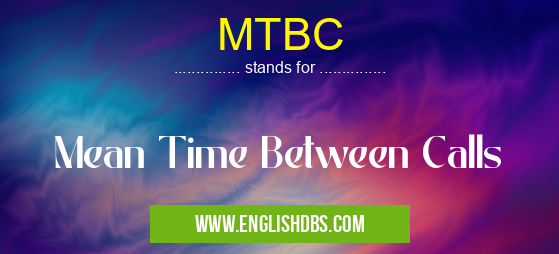What does MTBC mean in UNCLASSIFIED
MTBC (Mean Time Between Calls) is a metric used in customer service and technical support to measure the average time between incoming calls. It indicates the frequency of calls received by a support team and is a key performance indicator (KPI) for evaluating the efficiency of a support operation.

MTBC meaning in Unclassified in Miscellaneous
MTBC mostly used in an acronym Unclassified in Category Miscellaneous that means Mean Time Between Calls
Shorthand: MTBC,
Full Form: Mean Time Between Calls
For more information of "Mean Time Between Calls", see the section below.
Meaning and Significance
MTBC is an important measure because it:
- Reflects Customer Demand: A higher MTBC indicates fewer incoming calls, suggesting lower customer demand for support.
- Indicates Team Capacity: A low MTBC means the support team is receiving a high volume of calls, potentially indicating a need for additional resources or process improvements.
- Helps Identify Trends: Tracking MTBC over time can reveal seasonal patterns or sudden spikes in call volume, allowing for proactive planning and resource allocation.
- Facilitates Benchmarking: MTBC allows support teams to compare their performance against industry benchmarks or other teams within the organization.
Factors Affecting MTBC
Several factors can influence MTBC, including:
- Product or Service Quality: High-quality products or services tend to generate fewer support calls.
- Customer Education: Effective customer documentation, training, and self-service tools can reduce the need for support.
- Team Availability: Adequate staffing levels and efficient scheduling ensure prompt call handling, which can improve MTBC.
- Call Resolution Rate: Quickly resolving customer issues reduces the number of repeat calls and improves MTBC.
- Seasonality: Call volume may vary depending on the time of year or specific events.
Strategies to Improve MTBC
To improve MTBC, support teams can:
- Invest in Product Quality: Focus on developing reliable and bug-free products or services.
- Enhance Customer Education: Provide detailed documentation, tutorials, and FAQs to empower customers to resolve issues independently.
- Implement Self-Service Tools: Offer online chat, knowledge bases, and automated support options to reduce the reliance on phone calls.
- Increase Staffing and Training: Ensure sufficient staffing and provide ongoing training to enhance call handling efficiency.
- Analyze Call Trends: Identify patterns in call volume and plan accordingly to avoid bottlenecks.
- Set Realistic Performance Targets: Establish achievable MTBC goals based on industry benchmarks and team capabilities.
Essential Questions and Answers on Mean Time Between Calls in "MISCELLANEOUS»UNFILED"
What is Mean Time Between Calls (MTBC)?
Mean Time Between Calls (MTBC) is a metric used in telecommunications to measure the average time between incoming calls to a call center or service desk. It provides insight into the call volume and efficiency of the service operation.
How is MTBC calculated?
MTBC is calculated by dividing the total time spent on calls by the number of calls received during a specific period. It can be expressed in minutes, hours, or days.
What is the significance of MTBC?
MTBC is a key performance indicator (KPI) that helps organizations optimize their call center operations. A shorter MTBC indicates a higher call volume and potentially higher customer satisfaction, as callers are not kept on hold for long periods. On the other hand, a longer MTBC may suggest lower call volume or inefficiencies in call handling.
How can MTBC be improved?
Several strategies can be implemented to improve MTBC, including:
- Optimizing call routing algorithms to distribute calls efficiently.
- Increasing staff availability during peak call times.
- Implementing self-service options to reduce the number of calls.
- Training staff to handle calls quickly and effectively.
What are the limitations of MTBC?
While MTBC provides valuable insights, it does have limitations, such as:
- It does not consider call abandonment rates, which can impact customer satisfaction.
- It may not reflect the complexity of calls, as some calls require more time to resolve.
- It should be considered in conjunction with other KPIs to provide a comprehensive view of call center performance.
Final Words: MTBC is a valuable metric for understanding customer demand, evaluating support team performance, and identifying areas for improvement. By proactively addressing factors that impact MTBC, support teams can optimize their operations, enhance customer satisfaction, and reduce call volume. Consistently monitoring and improving MTBC is crucial for ensuring effective and efficient customer support.
